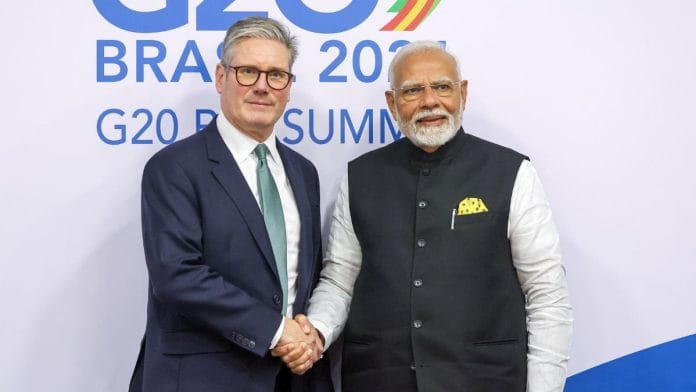New Delhi: India and the United Kingdom have concluded a “historic” and “ambitious” Free Trade Agreement (FTA), along with a Double Contribution Convention, that is, an agreement securing an exemption for Indian workers temporarily in the UK from social security contributions.
Announced on Tuesday, the FTA marks the first bilateral trade agreement between India and a Western country. The deal comes three years after negotiations began in 2022.
“Delighted to speak with my friend PM @Keir_Starmer. In a historic milestone, India and the UK have successfully concluded an ambitious and mutually beneficial Free Trade Agreement, along with a Double Contribution Convention,” Prime Minister Narendra Modi said in an X post. “These landmark agreements will further deepen our Comprehensive Strategic Partnership, and catalyse trade, investment, growth, job creation, and innovation in both our economies. I look forward to welcoming PM Starmer to India soon.”
In a statement, UK Prime Minister Keir Starmer said, “The leaders began by celebrating the landmark UK-India Free Trade Agreement announced today—a deal which will add billions to the UK economy, boost wages and deliver on this government’s Plan for Change.”
The original deadline of the deal was October 2022, as announced by the then-British prime minister Boris Johnson. Over three-fourths of the deal was agreed upon by the end of 2022. However, several challenges, including differences in position on substantive measures like services, manufacturing of specific goods, and legal mobility, remained, as ThePrint has reported earlier.
Among the reasons the deal could not be closed earlier were Indian tariffs on automobiles and alcohol, as well as political challenges facing the previous Conservative government. The negotiations for the FTA again started earlier this year, following a pause in 2024 due to the general elections in both countries.
Trade between the two countries stood at roughly $60 billion, estimated to double in the next five years. For Starmer, the deal is a foreign policy win, given that the Labour Party he leads faced an electoral setback in the local elections held in the UK last week.
For India, it completes the first of the three trade deals it is currently negotiating with Western countries. The other deals under negotiation are with the US and the European Union (EU). India signed a trade deal with the European Free Trade Association (EFTA) last year, but the FTA is the first bilateral trade deal. Four countries, Switzerland, Iceland, Liechtenstein, and Norway, are in the EFTA.
FTA highlights
The FTA will ensure “comprehensive market access for goods, across all sectors”, covering all of India’s exports, the Ministry of Commerce and Industry’s statement said. India will see the elimination of tariffs on nearly 99 percent of tariff lines, covering almost 100 percent of its total trade value with the UK.
It gives India access to the UK in the “textiles, marine products, leather, footwear, sports goods and toys, gems and jewellery and other important sectors such as engineering goods, auto parts and engines and organic chemicals” sectors.
The agreement will also ease mobility for several professionals, including contractual service suppliers, business visitors, investors, intra-corporate transferees, partners and dependent children of intra-corporate transferees, with rights to work, and independent professionals, such as musicians, yoga instructors, and chefs.
The Double Contribution Convention will see Indian workers “temporarily in the UK” and Indian employers exempt from contributing towards social security for three years. The convention will lead to savings of nearly 20 percent for Indian employees, amounting to a Rs 4,000 crore financial gain for Indian employers, when temporarily in the UK.
For London, the deal will see New Delhi locking in cuts on 90 percent of tariff lines, with 85 percent becoming tariff-free within the next decade. Furthermore, whisky and gin tariffs will be halved from 150 percent to 75 percent before being reduced to 40 percent during the 10th year of the deal, the British High Commission said in a statement.
Moreover, automobiles will be cut from 100 percent to 10 percent, along with a quota on British automobile imports. The deal will also see tariff cuts for British manufacturers in aerospace and high-end optical product sectors, while also giving more access to Indian markets to export lamb, salmon, medical devices, soft drinks, chocolate, and biscuits.
Sensitive products such as dairy, apple, and cheese, among other products, will be exempt from duty concessions.
India has also agreed on other chapters, including anti-corruption, consumer protections, labour rights, gender and development.
(Edited by Madhurita Goswami)







It is a miracle that socialist India has signed an FTA with the UK. For third-rate standards of free market in India, a 75% tariff is to be considered ‘free’. Meanwhile, communists are getting ready for their next protest.